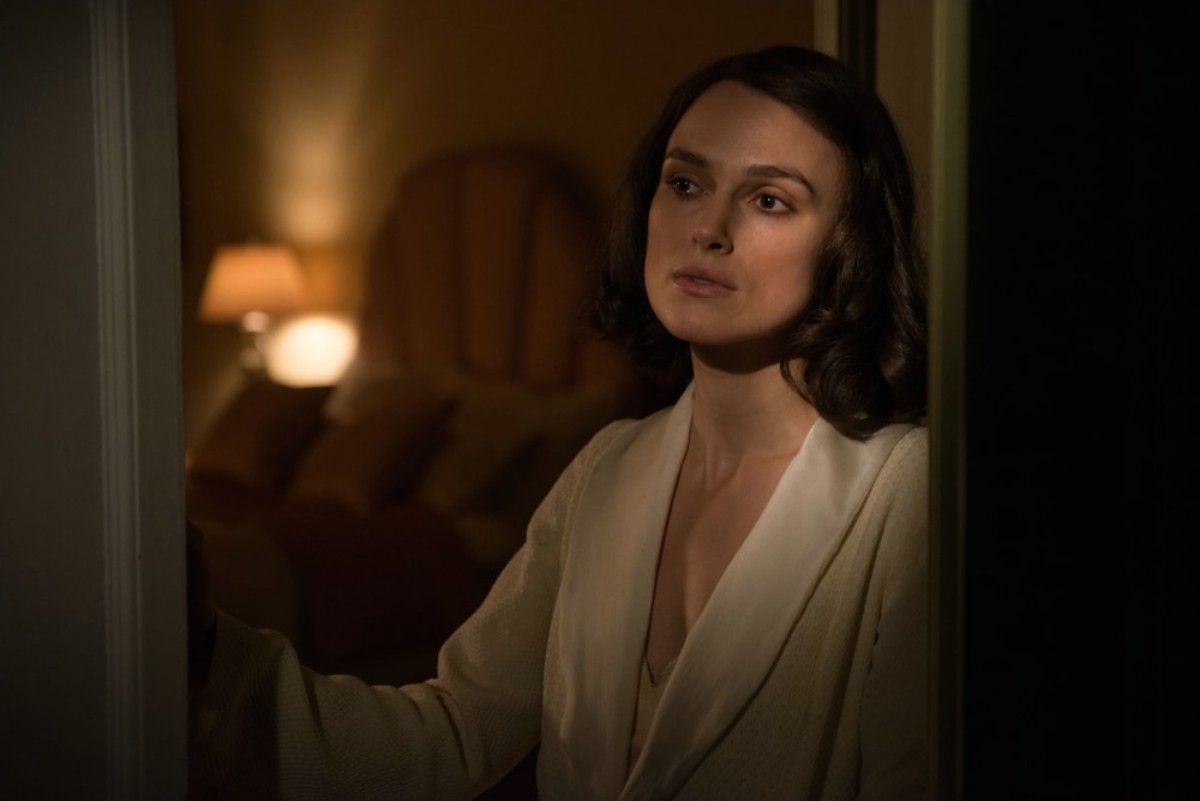Keira Knightley is a movie star in all the ways many of Old Hollywood’s greatest starlets were, even going so far as to carve out a genre niche for herself in much the same fashion as so many classic, radiant performers did. Joan Crawford eventually became synonymous with the rags to riches story, and audiences grew accustomed to seeing Lauren Bacall confidently bat words with Humphrey Bogart in shadowy pictures set in a hard man’s smoky world. For her niche, Knightley has repeatedly appeared in adulterous period melodramas where she betrays the man she is promised to – even going as far back as the first ‘Pirates of the Caribbean.’
Her newest film, “The Aftermath,” is another Knightley project dealing with that aforementioned melodrama, but is, unfortunately, a forcibly uninspired post-war romantic snore. It starts off potentially promising, compositionally chasing the feeling of a Douglas Sirk film, in the vein of “Written on the Wind,” but by the end, the lavish and (obviously) BBC-produced adaptation, feels more akin to a Nazi Hallmark Channel movie than a classic period melodrama.
Directed by British television director, James Kent (“The White Queen”), “The Aftermath” is adapted from a novel written by Rhidian Brooke (Joe Shrapnel and Anna Waterhouse penned the screenplay) and begins with an overhead shot of post-war Hamburg. Rachel Morgan (Knightley) reunites with her husband – a decorated officer named Lewis (Jason Clarke) – over ruins and rubble, both the literal condition of Europe in 1946 and an obvious metaphor for the current state of their relationship. There is an unspeakable sorrow between the two, seemingly surrounding their son, whom we see in a photo inside Lewis’ cigarette case, yet is invisible so far as conversations go. A seasoned audience member will almost immediately be able to intuit what happened to fracture the bond between our story’s central couple, and the movie’s insistence on withholding its reveal of obvious information, inferred quite easily, is very frustrating.
Upon her arrival in Hamburg, Rachel learns that her husband has made arrangements for them to stay in a German palace with a recent widower, Stephen (Alexander Skarsgård), and his daughter. Two obvious film tropes ensue; romantic tension between the grieving parties and finger pointing shame over the guilt of his potentially troubled past (i.e. his Nazi ties). Lewis is often out of the house as a result of his military duties, and as you might guess, the two deeply wounded souls, Rachel and Stephen, deal with potentially irreparable absence housed together inside a massive mansion. It’s clear right from the start where this plot is headed.
A distracting subplot surrounding Stephen’s young offspring branches off randomly and can’t quite figure out how it fits into the narrative; that is, until a visual reveal makes it apparent the whole tangent was only planted to seed an unnecessary, dramatic action component towards the climax. This side story feels so disconnected, one often forgets the branch is even part of the tree, and its growth builds to nothing more than a cliché explosion of violence seen in almost every other Nazi spy movie.
Two scenes where Rachel has tea with a friend feel like structural bookends, serving little function. Artistic choices continually only accentuate what the audience surely already knows. Handheld camerawork is used sparsely for the few violent sequences, only adding a texture the narrative has already insured you’re feeling. The score swells in the most obvious moments – often being triggered by extreme switches in mood enabled by intense interpersonal conflict.
Knightley is excellent though, as she somehow both embodies the qualities of a royally inquisitive cat and frightfully tense mouse. She has the ability to sway between timid and excitable, often making it appear effortless. Skarsgård and Knightley don’t have ideal chemistry, but there is a rugged charm about his strong silent-type swagger that elevates the standard material he’s saddled with in several scenes. Clarke seems to have been cast simply for his exhausted, uniformed demeanor, and he’s fine, serviceable, but looks tired half the time – to be fair, that is very much in character. Still, he and Knightley have a far more believable relationship than the foreboding forbidden one between her and Skarsgård – which seems odd at first, but there is a through-line to it.
The narrative of “The Aftermath” is so antique it assumes astute viewers will have already recognized its semiotics. Kent’s movie is obsessively preoccupied with colored symbolism, as the aforementioned Douglas Sirk’s films were. The juxtaposition of brown and blue – a fine conceptual idea, but uninspired palette for anything set around WWII in our current age – is irritatingly predominant for the introductory stretch, although it doesn’t get all that subtler, moving forward. Red seems to remain elusive, but – as in so many movies – there is a significance to its initial absence, one that will be seeded with impressionistic close-up flashes, and paid off with an obvious breakdown of emotions.
“The Aftermath” is simply another period melodrama that knows exactly what it is, and that just isn’t quite enough, especially when one considers the leading star’s career oeuvre. [C-]





